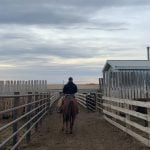The practice of agriculture as it is done today, is exactly the same as that which led to the destruction of more than 20 past civilizations, according to holistic management founder Allan Savory.
“When I look at the people trying to sequester carbon, as Al Gore is talking of, this is wonderful stuff. I’m not knocking it in any way,” said Savory at a conference in Brandon on Feb. 13.
“But even if we were 100 percent successful tomorrow in not putting any more carbon from fossil fuels into the air, we would still fail to save civilization.
Read Also

Bunge to acquire North West Terminal Ltd.
Bunge plans to buy the assets of North West Terminal in Unity, Sask.
“Why? Because we haven’t answered why 20 civilizations failed before we discovered coal and oil. There are other things to deal with that are not going to be changed by taking all the carbon out of the air. We have got to go deeper, and we risk everything if we don’t.
“It’s all about humans, as I’ve come to realize. Only through relationships, trust and working with one another (is it) that we are going to be able to save our families, our communities and ourselves now that our whole global civilization is under threat.”
Born in Zimbabwe when it was still Rhodesia, Savory began his career as a wildlife biologist and later as a politician amid that country’s civil war. Alarmed by the degradation and desertification of grassland ecosystems and the increasing poverty that he saw occurring as a result, Savory began looking for answers, which eventually led him to the concept of holistic management.
“This is the greatest and last battle that humanity will fight: how to live with ourselves and our environment in harmony,” he said. “If we lose this one, we’re gone. Civilizations have been failing all along, but now the threat is global.”
Savory settled in the United States after being exiled from Rhodesia in the late 1970s and in 1984 became founding director of what is now known as Holistic Management International.
He noted that prominent scientists who long warned of the dangers of nuclear weapons proliferation are now saying that the environment is an even greater threat.
“I think that in the next year or so, now that the denial is almost over, we’ll see exponential growth in awareness of the environmental threat that we all are facing,” he said. “Soon it will dwarf all other issues; it will be the only issue.”
A shift must be made away from increasingly complicated solutions toward simplicity.
“Family by family, community by community, beginning to do the right thing,” he said. “Not from the top down.”
He cited a book that stated $2.3 trillion had been wasted trying to help developing countries because the relief strategies were designed from the top down.
Politicians are bound by the level of readiness of the electorate to embrace change, so it must originate from the grassroots.
The other obstacle is the supporting bureaucracy, which is “water-tight” to new knowledge. Government and bureaucracy must change, he said.
As an example, he said the British navy allowed thousands of sailors to die of scurvy before it accepted – 200 years later – that lime juice was the cure.
On the positive side, he said, these are exciting times. The threat of global warming may be the catalyst for bringing people together because failure is not an option.
“They are talking about the demise of city-based global civilization. They are predicting that we will sustain ourselves as nomadic family groups, as we had before,” he said.
“I think it will be more serious. If we fail, we will see all higher life forms going, and the world will go on without us.”
As a young man, Savory devoted his life to trying to save the big game of Africa.
“I was prepared to do anything to bring that about,” he said. “It was what gave my life meaning.”
He later concluded that he and his fellow bureaucrats in Rhodesia’s game department, with their insistence that drought was the problem, were a far greater danger to the animals than the poachers. With this realization, he began to connect the welfare of the animal population to the state of the soil.
“What was needed to save the wildlife was exactly the same thing needed to save the people,” he said.
He gradually began to see that the solution to land deterioration, violence, poverty and social breakdown was the same as what was needed to save the wildlife.
“I hated cattle and ranchers. I was on public record saying I was prepared to shoot any goddamned rancher in the country.”
Blinded by his ignorance of the real causes of creeping desertification and declining wildlife populations, he said he committed serious blunders, including the culling of big game in the national parks.
“I shot thousands of elephants because I had proved that there was too many,” he said. “So don’t fear making as many mistakes as I made. You can’t be that stupid.”
Eventually, a visit from a prominent ranching couple changed his attitude. They told him how they had tried everything that the local research stations recommended and their land had become worse. This experience convinced him that ranchers loved the land as much as he did.
Savory said holistic management is profoundly simple: decide what you truly want in life, link it to your life support system, open your mind to new thinking and use that as a simple framework to bring in new tools, such as management intensive grazing, and make decisions in a socially and environmentally sound way.
“It’s simple, but it’s not easy because it involves change and it involves humans,” he said.














